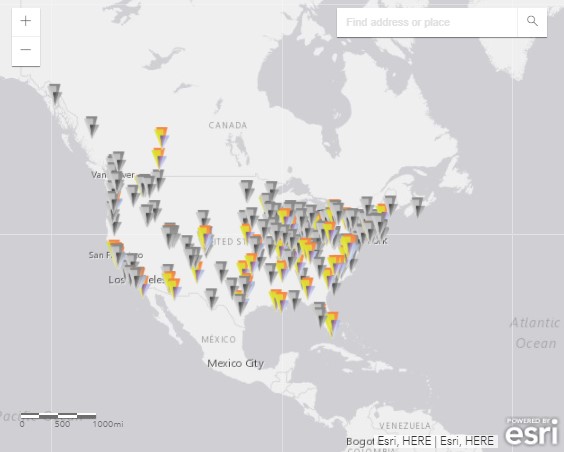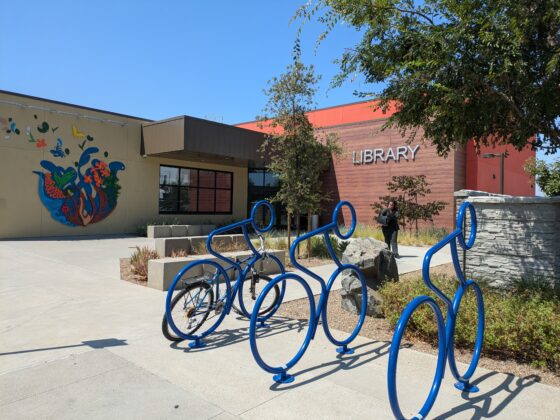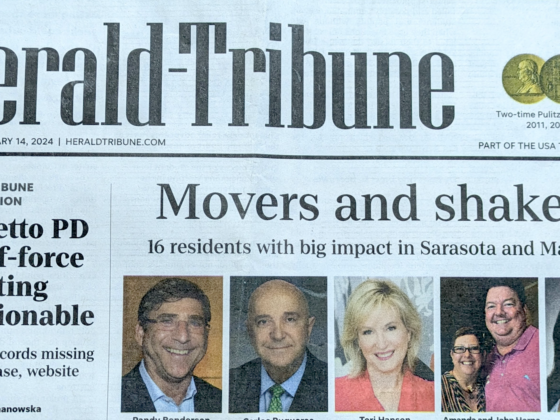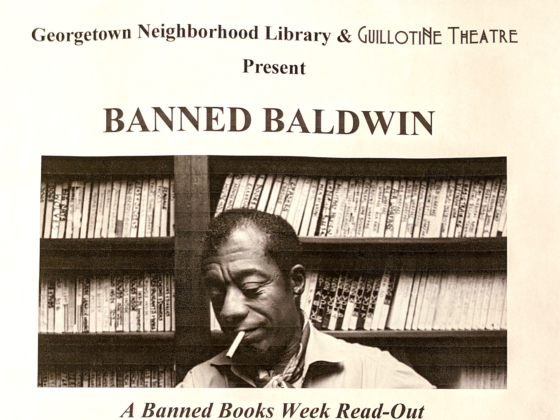When I was a kid, the sin of returning books late to the public library populated a category of dread for me next to weekly confessions to the Catholic priest (what can an 8-year-old really have to confess?) and getting caught by the dentist with a Tootsie Roll wrapper sticking out of my pocket. So decades later, when I heard about libraries going “fine-free,” it sounded like an overdue change and a nice idea.
Collecting fines for overdue books has been going on for over a century, originally seen as a source of revenue and as an incentive for people to behave responsibly and actually return borrowed books. Then, as early as the 1970s, research and experiments with going fine-free began to pick up steam. But as recently as four years ago, over 90 percent of libraries in the U.S. were still charging small change for late returns.
A Seinfeld episode from 2009, called The Library Cop, seems at once timely and untimely. This is Seinfeld; it will make you laugh.
Missions, Policies, Changes:
The last five years have been very busy in the world of overdue fines. In what has been the “Fine-Free Movement,” many librarians have begun to question the traditional policy of overdue fines, and attitudes have begun to change. Are fines consistent with a fundamental mission of libraries: to serve the public with information and knowledge? And to address that mission equitably across the diverse population of rich and poor library users?
A 2016 Colorado State Library system report showed that eliminating overdue fines removed barriers to access for children. While some people only notice fines as an irritation, others feel the weight heavily enough to be driven away from the library.
In 2017, a Library Journal poll of 450 libraries found that over 34 percent considered eliminating at least some fines.
In 2018, a poll of Urban Libraries Council (ULC) member libraries found that the most common reason (54 percent, dwarfing all others) responding libraries had gone fine-free was that eliminating fines increased access for low-income users and children.
By late in 2018, several big-city public-library systems including San Diego, Nashville, Salt Lake City, Baltimore, St. Paul, and Columbus, Ohio eliminated overdue fines.
The powerful American Library Association, representing some 55,000 members, adopted “a resolution of monetary fines as a form of social inequity” at their midwinter meeting in 2019.
In January, 2019, the city of San Francisco issued an extensively-researched and influential report called Long Overdue, on the impact of fines on the mission of libraries, and the costs of eliminating fines on libraries, users, and the city and county of San Francisco. The report ultimately recommended eliminating overdue fines throughout the public library system.
When the pandemic closed libraries and made it hard or impossible for people to return books, many libraries revisited their policies on overdue fines. In Washington D.C., an early shorter-term amnesty experiment at the beginning of COVID-19 grew into a subsequent vote by the Public Library Board of Trustees to expand eliminating fines for only youth, to everyone.
Experiments in fines, amnesties, alternatives:
Libraries have been experimenting with lots of different ways to address fines for overdue books. Some stopped fining all patrons; others only children or youth; still others exempted active military and veterans from fines. Some forgive fines up to a certain dollar amount. Santa Barbara, California, follows one common practice—forgiving fines for a certain number of days (30 in this case) days, then charging for the cost of the book, which can be forgiven upon its return.
Lost or damaged books are in a different category. The loss of a book is much more costly and cumbersome to a library than a late return, and libraries work out various ways to address that.
When libraries offer popular amnesty periods for returning overdue books, the books often pour in like gushers. An amnesty program in Chicago brought in 20,000 overdue items; Los Angeles nearly 65,000; San Francisco just shy of 700,000. And a bonus: After the Chicago library went fine-free, thousands of users whose fees were forgiven returned to the library for new cards, and readers checked out more books overall than before.
Other libraries found substitutes for monetary fines. In 2018, the public libraries in Fairfax County, Virginia, began a food-for-fines program, which collected 12,000 pounds of food to donate to a nonprofit food pantry. Each donated item accrued one dollar toward a maximum $15 fine forgiveness. In Queens, New York, the public library has a program for young people to “read down” their 10-cent per day fines. One half hour of reading earns one dollar in library bucks to pay off fines.
Calculating costs of fines and the benefits of going fine-free:
The 2017 Library Journal poll of about 450 libraries across the country estimated that nearly $12 million in monthly library fines would be collected nationwide that year.
In fact, loss of revenue takes different size bites from libraries’ budgets. Some seemed like nibbles. When the New Haven, Connecticut, public library went fine-free in July 2020, the sum of overdue fines was less than one-quarter of one percent of the library’s annual budget. In San Francisco, fines in FY 2017-18 represented 0.2 percent of the operating budget. In Schaumburg Township, Illinois, 0.25 percent of the annual budget. In Santa Barbara, 1 percent. The St. Paul, Minnesota, libraries found that they spent $250,000 to collect $215,000 in fines.
But a late 2018 ULC poll of its roughly 160 members reported that one in five libraries that were considering eliminating fines named the biggest deterrent as financial. (Only larger was political reasons, at 34 percent.) The Long Overdue report found that fines disproportionately harmed library customers in low-income areas and those with larger proportions of Black residents. While libraries in all areas “accrued fines at similar rates,” those located in areas of lower income and education and higher number of Black people have “higher average debt amounts and more blocked users.”
As Curtis Rogers, the Communications Director of the Urban Libraries Council described the findings to me: “Overdue fines do not distinguish between people who are responsible and those who are not—they distinguish between people who have or do not have money.”
Funding sources for libraries vary considerably. Some libraries enjoy a secure line item in a city or county budget. Others patch together a more fragile existence of fundraising, philanthropy, public bonds and levies, and other sources.
Other factors have changed the landscape as well. The growth of e-book lending, which can automatically time out and incur no fines, have cut into overall fine revenue numbers somewhat.
To make up for losses in revenues, libraries have come up with creative answers. For example: processing passport renewals; a “conscience jar” for overdue books; charging fees for replacing lost cards and for copying, scanning, and faxing; charging rent for community rooms or theaters; and general tightening of spending.
The impact of fines should be measured in ways beyond cash revenues. Collecting fines and blocking accounts can be time-consuming, stressful, and unpleasant for librarians, and can cause general discomfort and even ill will in a community.
I witnessed a small episode of the toll that fines can take on the strong currency of people’s trust and goodwill in libraries. During a summer visit a few years ago to the public library in an unnamed town in the middle of the country, I was hanging around the check-out-desk when I saw a man reach the front of the line to borrow a few books. The librarian told him that his card was blocked, and he needed to pay his fines before he could borrow the book. The man was part of the town’s sizable Spanish-speaking population, and he didn’t understand the librarian. She repeated her message, louder each time. A line was building at the check-out. Finally, the man went to fetch his elementary-school-age daughter to translate for him. It all ended badly: He was embarrassed, the daughter was embarrassed. Others like me who witnessed the exchange were embarrassed. The man left without borrowing the books. The librarian was stuck behind non-transparent rules, although I have seen more gracious handling of such situations.
In 2016, the Orange Beach, Alabama, public libraries swapped overdue fines with voluntary donations, which they soon dropped as well. Steven Gillis, the director of the public library, wrote that the overall goodwill the library earned in the community with their new fine-free policy had leveraged into increased municipal funding from a sympathetic and appreciative city council.
The Long Overdue report also found that eliminating fines increased general goodwill between users and staff, and also increased the numbers of users and the circulation of books. They saw no increases in late book returns.
In 2018, a young research fellow at the Urban Libraries Council (ULC), Nikolas Michael, set out to tell the story of libraries going fine-free by creating an interactive map, which has since become one of ULC’s most used resources.
Here is the map and how it works:

View interactive map. Provided courtesy of the Urban Libraries Council
Each arrow on the map represents a library that ULC has logged to tell its story of going fine-free. The gold arrows are ULC member libraries; silver are non-member libraries.
The map is interactive; click on an arrow and you’ll see some of the whys, wherefores, and impact of the change on a particular library. The map updates with each additional entry.
Curtis Rogers, from ULC, and Betsey Suchanic, a program manager there, described on a Zoom call the background and impact the map has made on telling the story and building a movement.
The map helps libraries make well-informed decisions, as they use it for research and evidence to weigh the pros and cons of going fine-free.
In Philadelphia, Councilwoman Cherelle Parker called for a hearing to explore eliminating fines at the Free Library of Philadelphia. She directly referenced the ULC map of fine-free libraries as evidence. ULC also submitted written testimony for the hearing.
The map and ULC’s other reporting on the fine-free movement contribute to larger-context conversations—for example, on the topic of the pros and cons of other kinds of municipal fines, like parking tickets.
The Public Library of Youngstown and Mahoning County just went fine-free, and they used the map specifically to make their case to their board. You can see the map on page 8 of the library’s PowerPoint presentation.
America’s current national focus on issues of racial, economic, educational, health, and environmental equity, and on policing and justice, has a way of reaching a sound-bite ending in media segments or conference panel wrap-ups. It goes something like this: “We need to have a national conversation about …”
Public libraries, which are in business to be responsive to public needs and wants, are a model for moving beyond conversations to action. For example, public libraries open their doors to homeless people, they feed hungry children in after-school programs, they offer free Wi-Fi access for people and places (especially rural) where it is hard to come by, and in increasing numbers, they find ways to forego monetary fines. These actions shore up in a tangible way a major mission of public libraries: to provide equal access to information and knowledge for all citizens.




